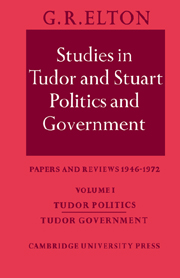Book contents
- Frontmatter
- Contents
- Preface
- Acknowledgments
- Abbreviations
- 1 The Terminal Date of Caesar's Gallic Proconsulate
- I TUDOR POLITICS
- 2 Renaissance Monarchy?
- 3 Henry VII: Rapacity and Remorse
- 4 Henry VII: a Restatement
- 5 The King of Hearts
- 6 Cardinal Wolsey
- 7 Thomas More, Councillor
- 8 Sir Thomas More and the Opposition to Henry VIII
- 9 King or Minister? The Man behind the Henrician Reformation
- 10 Thomas Cromwell's Decline and Fall
- 11 The Good Duke
- 12 Queen Elizabeth
- II TUDOR GOVERNMENT
- General Index
- Index of Authors Cited
2 - Renaissance Monarchy?
Published online by Cambridge University Press: 03 February 2010
- Frontmatter
- Contents
- Preface
- Acknowledgments
- Abbreviations
- 1 The Terminal Date of Caesar's Gallic Proconsulate
- I TUDOR POLITICS
- 2 Renaissance Monarchy?
- 3 Henry VII: Rapacity and Remorse
- 4 Henry VII: a Restatement
- 5 The King of Hearts
- 6 Cardinal Wolsey
- 7 Thomas More, Councillor
- 8 Sir Thomas More and the Opposition to Henry VIII
- 9 King or Minister? The Man behind the Henrician Reformation
- 10 Thomas Cromwell's Decline and Fall
- 11 The Good Duke
- 12 Queen Elizabeth
- II TUDOR GOVERNMENT
- General Index
- Index of Authors Cited
Summary
Not so long ago the sixteenth century could be considered as nearly worked out: perhaps there might be details to fill in, but the outlines stood firm and clear. However, of late, as we have learned more about the middle ages, our confident generalizations about the Tudor period have grown less and less convincing. Was it the beginning of fresh things or the end of old, the first modern or the last medieval century? Or have these terms perhaps no meaning at all? What is the truth about Tudor monarchy? What place does the period occupy in the development of Parliament? Was its preoccupation with religion real or a screen for – at a guess – economic forces? The questions accumulate. The old answers too often fail to accord with new views of the centuries surrounding the sixteenth, and the old methods lead nowhere. There are marked weaknesses in the old approach, with its undue reliance on printed material and its eyes fixed on later political developments, weaknesses which the spread of the techniques of medieval scholarship is constantly revealing. What has to be grasped about the changed thinking in these matters is that there is no question of just correcting points of detail or of discovering a few new facts. A whole complex of underlying ideas, a whole frame of reference, is being discarded. It is this that makes synthesis so difficult.
- Type
- Chapter
- Information
- Studies in Tudor and Stuart Politics and GovernmentPapers and Reviews 1946–1972, pp. 39 - 44Publisher: Cambridge University PressPrint publication year: 1974



